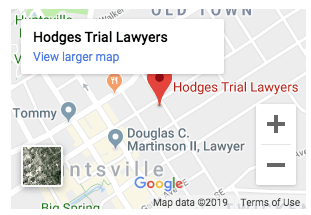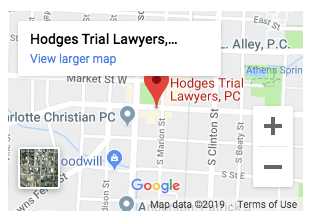In many auto accident claims, investigations come down to your word versus the other driver’s word. This isn’t helpful when the physical evidence of the crash is ambiguous and could point to either driver as the liable party. Luckily, when this happens, there are other ways to prove that your claims are accurate.
Your car’s black box may be an excellent source of information and evidence after a crash. However, you do have to move quickly to preserve that evidence and use it to your benefit. Call Hodges Trial Lawyers at 256-539-3110 to set up a consultation right away.
What Information Does the Black Box Have?
Most vehicles come with a black box installed. Just like the black box you hear about being analyzed after a plane crash, the black box in your car may have relevant crash information you can use.
Some of the data captured by the black box include:
- How fast the driver was moving shortly before and during the crash
- Sudden accelerations or decelerations
- Braking patterns, which may indicate whether or not a driver was distracted
- Whether or not the airbags were deployed
- How many crashes occurred and when they occurred—this may be necessary for a crash involving more than two vehicles, as it may point to who is liable
- If the seatbelts were in use at the time of the collision
- The steering wheel position at the time of the crash, which may show whether or not the driver was attempting to avoid another obstacle
Using This Information to Support Your Claim
The raw information provided by the black box can be useful on its own, but that’s not enough. You need expert analysis by someone who can look at the data and place it in the context of a traffic crash. On top of that, you can’t even access the black box data on your own.
Some expect it to be something you can simply download from the vehicle’s computer and analyze on your own device, but that isn’t the case. Law enforcement, crash investigators, and others in this field may be able to pull the data and analyze it appropriately.
Your attorney will be able to tell you whether or not the information on your vehicle’s black box is useful to you. Remember, evidence is inherently neutral. It may help you by showing that your claims are accurate.
On the flip side, it could show that you made crucial errors prior to the impact that may make you partially liable. This could give the other party evidence to use against you during negotiations or court. Your attorney will be well aware of this risk and know how to navigate it.
Don’t Forget the Other Driver’s Car
Although your vehicle’s black box is full of data, make sure to consider the other half of the crash. The other driver’s car likely has a black box that your attorney may be able to access. This is particularly important if the other driver’s retelling of the accident is wildly different from yours.
For example, imagine that they insist they tapped your car at a low speed, while you claim they were driving much faster. If their vehicle’s black box shows their speed and indicates that the airbags deployed, your attorney may be able to show that their retelling isn’t exactly reliable.
How an Attorney Can Help
Your attorney will know how to use black box information and if you even need it. In some cases, black box information is overkill—it simply isn’t necessary. For example, if you and the other driver agree on the basic facts of the crash, you don’t need to go overboard proving facts that you both already agree on. Your attorney will then be able to use their time on more important aspects of your case.
Reach Out to Hodges Trial Lawyers Now
When you hire an attorney for your car crash claim, you want one that is able to represent you both in negotiations and in court. That’s why Hodges Trial Lawyers is the right firm for you. Our extensive experience in personal injury law makes us the obvious choice for your claim. Set up a consultation now by calling us at 256-539-3110 or reaching out to us online.



